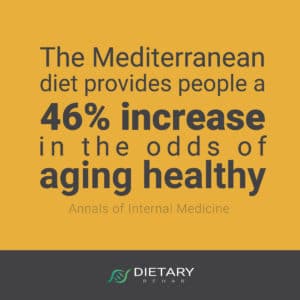
If you are like many people who are looking to get healthy and reduce your risk of heart disease, you have probably considered, or already abide by, the Mediterranean diet.
Originally, a study published in The New England Journal of Medicine stated that people in a test group who followed the Mediterranean diet had fewer incidents of heart attack or stroke than those who were simply told which fats to eat or avoid. The conclusion was that the Mediterranean diet is actually a way to decrease the risks associated with cardiovascular disease.
The study was touted as a blind study with a control group and two test groups that were randomly chosen. There were a number of study locations that people could visit to sign up and participate. These participants were given either olive oil, nuts or instructed to avoid certain types of fats. The results did show that those given olive oil or nuts had a lesser incidence of cardiovascular events, such as heart attack or stroke.
Flaws in the Original Mediterranean Diet Study
Unfortunately, many of the claims this study made were recently retracted due to a number of exaggerated details that were found in a later review of the original research. The review found a potential error in the randomization process.
When researchers reviewed the study, they found that one of the study locations had enrolled each patient that went to the same clinic on the same exact diet plan, rather than randomly assigning a plan. This meant 467 patients were using the same diet plan all at the same location.
Another issue had to do with households that contained more than one study participant. These participants were immediately placed on the same diet the other member of their household was following. A more accurate way to test the effectiveness of the diet would have been to assign each participating member of the household to a different plan. Although, one could see why they placed them on the same plan, since most households cook and eat together.
Another issue with the original study had to do with the selection process in general. Most, if not all, of the study participants were selected from largely homogeneous genetic communities in the Mediterranean region. This can affect the results in a negative way, as people with the same genetic qualities and living in the same communities often have the same types of health risks.
Therefore, the study only focused on a select group of individuals rather than a widespread and diverse panel of participants.
Important Distinction
Because of the initial study results, the media touted the findings as showing a benefit for anyone who is at a higher risk for cardiovascular diseases or incidents. While eating healthfully will always have a number of benefits, claiming that one diet can benefit anyone in general can be very misleading.
The revised study now says that it is unsure if the diet would have any such benefits in people with a lower risk of heart problems or from different regions of the world.
Should the Diet Be Ignored Now?
With the retraction of the initial results following a review of the original study, many people have begun to question whether the diet is really as healthy as originally advertised. While the randomization and selection process may change the results of this particular study, it doesn’t mean the diet is not healthy or that those looking to reduce their risk of cardiovascular disease shouldn’t try it.
The key factor to look at when deciding if a nutrition plan is healthy or if it will have the benefits you desire is whether it is a sustainable diet. With the multitude of fad diets that come and go each year, many people are skeptical of trying anything called a diet.
It’s More Than a Diet
The Mediterranean diet is not so much a diet as it is a conscientious lifestyle change for those who follow it properly. By avoiding certain foods and adding more of others, you begin to rethink the reasons you eat what you eat each day. If you stick with the lifestyle change, you will see the results that your body is capable of.
It is also important to know what your own body is capable of achieving when adopting a diet. While you may see the models on the covers of magazines and think, “I can do that if they can,” you may be overlooking whether your body type is even capable of looking that way.
Consider your bone structure and muscle structure when setting goals for what you want to achieve. This is important no matter which diet plan you choose to follow.
Feel Free to Stick with the Mediterranean Diet
The Mediterranean diet is more than a fad. It is a total lifestyle change in the way you prepare and eat food. It works by focusing on healthy fats, lean protein, fruits and vegetables. (Lean protein includes fish and chicken while avoiding red meat, which can be higher in unhealthy fat.)
If you are interested in more information on health, diets, recipes and overall lifestyle changes, enter your email address above to subscribe to our blog. Also, click below to learn more about the specifics of the Mediterranean diet.

 Finding healthier, easier ways to eat with enjoyment is a favorite American pastime. One of the premier diets getting a whole lot of attention is the Mediterranean diet.
Finding healthier, easier ways to eat with enjoyment is a favorite American pastime. One of the premier diets getting a whole lot of attention is the Mediterranean diet. As the Mediterranean diet, followed in its entirety, creates a big picture mapping out a person’s day-to-day behaviors, committing to this program engages a more holistic lifestyle shift. Other diets, due to their temporary nature, do not support long-term use by the participant, setting up a recipe for failure.
As the Mediterranean diet, followed in its entirety, creates a big picture mapping out a person’s day-to-day behaviors, committing to this program engages a more holistic lifestyle shift. Other diets, due to their temporary nature, do not support long-term use by the participant, setting up a recipe for failure.
 The benefits of living a Mediterranean lifestyle are backed by science. Those who practice this diet regularly realize healthy weight loss while minimizing their risk of heart attack, type 2 diabetes, stroke and early death. In addition, the risk for certain cancers, such as head, neck, prostate and colon, is reduced.
The benefits of living a Mediterranean lifestyle are backed by science. Those who practice this diet regularly realize healthy weight loss while minimizing their risk of heart attack, type 2 diabetes, stroke and early death. In addition, the risk for certain cancers, such as head, neck, prostate and colon, is reduced. To get a taste of how the Mediterranean diet can make a difference in how you feel, try this:
To get a taste of how the Mediterranean diet can make a difference in how you feel, try this:









